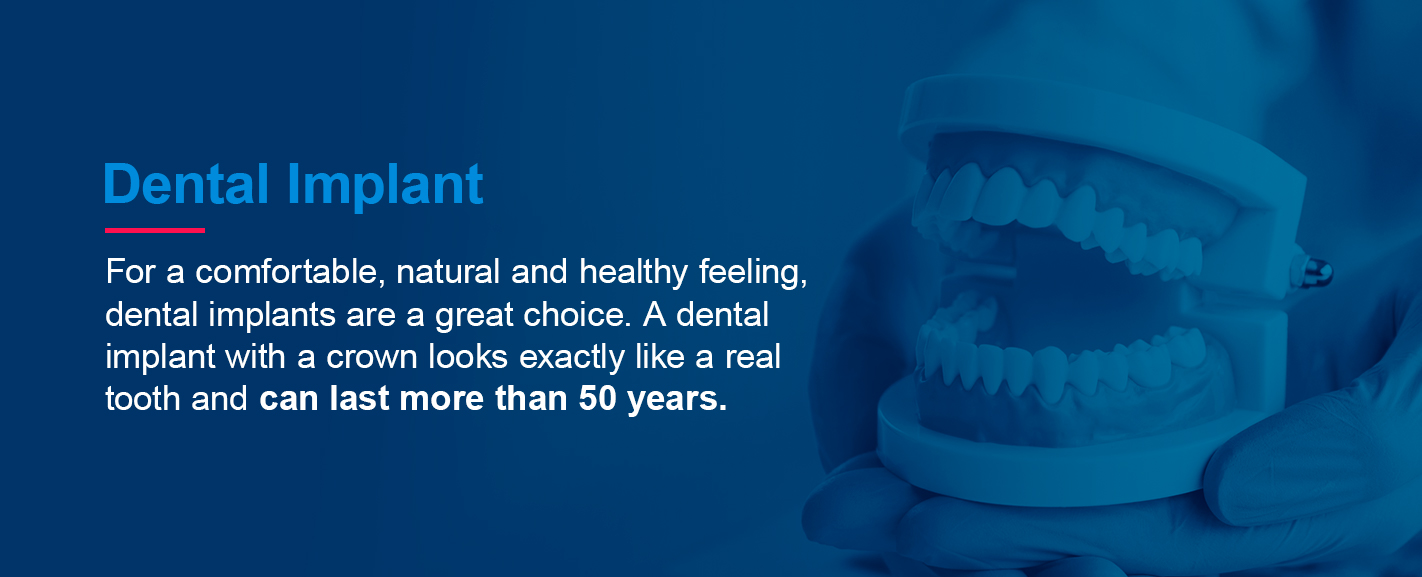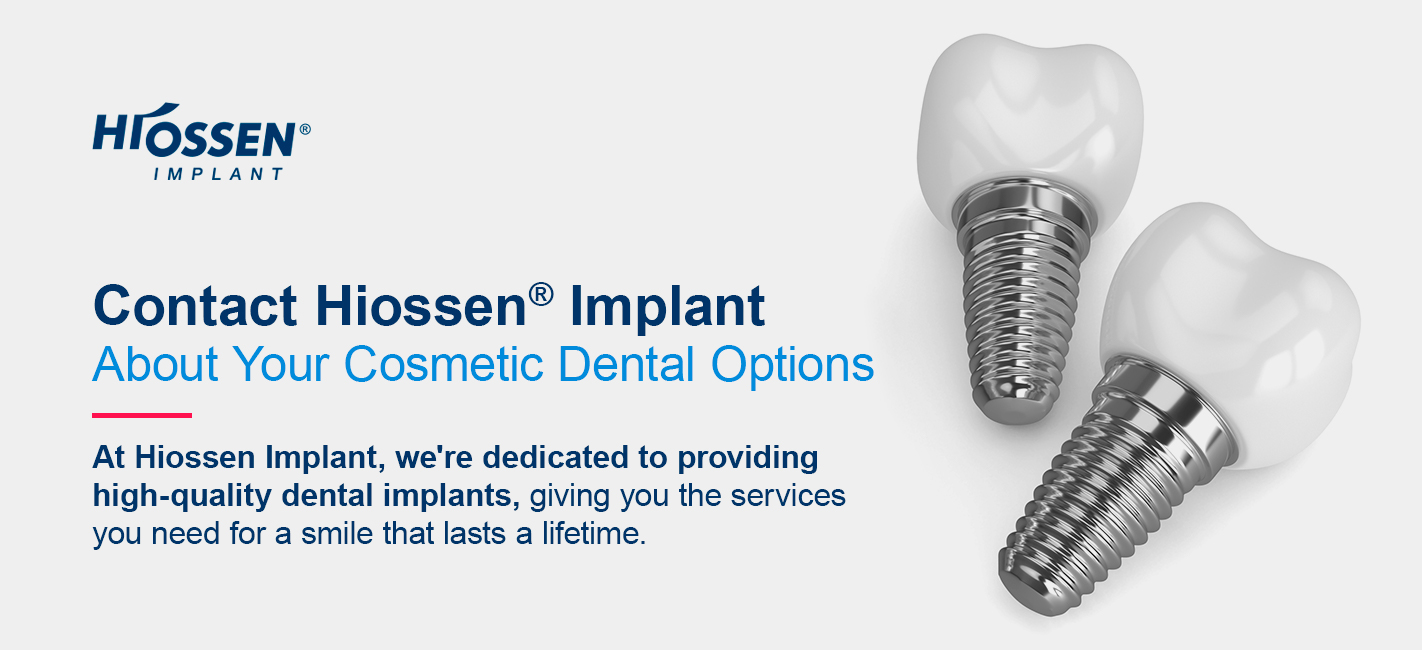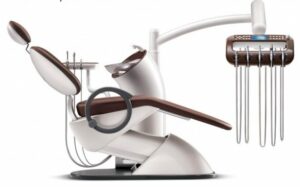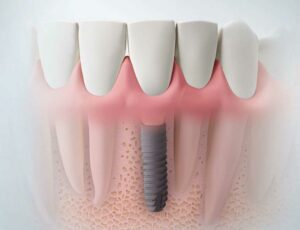Cracking a tooth can be a real pain both literally and figuratively if you don’t know which dental procedure would be best for you. Between dental implants and veneers, it can be hard to know what the right dental decision is for fixing a broken tooth.
If you want to learn more about your cosmetic dentistry options, check out our ultimate guide to dental veneers vs. implants. We will address dental procedure questions like how long veneers last and whether dental implants are cheaper than veneers, giving you the information you need to stay informed.
What Are Dental Implants?
Dental implants replace a damaged or missing tooth with man-made tooth roots designed to attach the replacement tooth securely to the gums. Implants are different from crowns because they completely replace a tooth rather than encasing the tooth as the latter does. Because they replace a tooth permanently, dental implants are extremely durable and stable, making them strong enough to last many years.
To replace a lost tooth with an implant, titanium metal pieces are inserted into the jawbone to fuse it with the implant. Then, the procedure is finished with a crown restoration to protect the implant. The finished product will look nearly identical to natural teeth, especially if the implant is a back tooth where the metallic root is less noticeable.
What Are Veneers?
Instead of replacing the whole tooth, a veneer simply covers the front surface of a damaged tooth. As thin, tooth-colored shells, veneers can conceal a broken or chipped tooth. Most veneers are porcelain or ceramic and can repair a range of cosmetic dental concerns from chips and breaks to stains and gaps in teeth.
Veneers are bonded to teeth with a dental adhesive to create a straight, flawless smile. Similar to crowns, the veneers are applied to both the top and bottom teeth to enhance their natural appearance. The visual appeal of veneers makes them most suitable for front teeth.
Can You Get Veneers If You Have Dental Implants?
Both implants and veneers are viable dental options, and they don’t have to be used exclusively. Veneers can be placed over your dental implants to provide a smoother appearance and more even smile. Implants and veneers are often used in combination to get the best cosmetic results.
What Are Lumineers?
Dental lumineers, which are also sometimes referred to as “no-prep” veneers, are a specific brand of veneers. These thin laminate covers are placed directly on the surface of the teeth to correct and improve their appearance. From fixing chipped or cracked teeth to helping fill in gaps or space between teeth, lumineers improve both the form and function of your smile.
Once the veneers bond to your teeth, you’ll be able to resume your typical dental routine. Floss and brush as usual while you enjoy a confident new smile.
What Is the Difference Between Veneers and Lumineers?
Veneers and lumineers share several similarities, but they also have a few key differences. While both are thin and easy to apply, lumineers are about half as thick as veneers. With veneers, your dentist will have to remove a bit of your natural tooth materials. Since lumineers are much thinner, dentists can place them directly on your teeth’s surface. The veneer application process also tends to be quicker because you won’t require any anesthetic.
Since lumineers are thinner and more translucent, they’ll provide you with a more natural look compared to porcelain veneers.
How to Choose Between Veneers and Lumineers
Both veneers and lumineers can correct dental issues and create a beautiful smile. Deciding which option you should choose depends largely on whether you want a more permanent or reversible dental solution.
Dentists remove part of your tooth enamel when applying veneers, which means this solution isn’t reversible. Lumineers, however, don’t require the removal of any tooth material, making it easier to reverse or change this process later on.
Another factor you should consider is cost. Lumineers typically cost more than porcelain veneers. While they may be more expensive, the price difference between lumineers and veneers has decreased in recent years.
Which Last Longer, Veneers or Lumineers?
Veneers and lumineers are both durable dental options. With proper care, these options are meant to last you a long time. Lumineers are thinner than traditional veneers, which may lead to a shorter lifespan than thicker treatments. However, you can still expect lumineers to last up to 20 years or more with the proper care.
Lumineers Pros and Cons
When you choose dental lumineers, you’ll take advantage of several benefits. The lumineers application process is less in-depth and more comfortable compared to veneers, which require preparation and trimming natural teeth. Along with a shorter appointment time, you’ll quickly be allowed to start eating and drinking as usual once lumineers are in place. Lumineers will help you achieve a natural-looking smile while improving your dental health.
Lumineers will help you achieve a natural-looking smile while improving your dental health. Since lumineers aren’t permanent, you’ll have the option in the future to remove them without damaging your teeth.
Keep in mind that because they are thinner than veneers, lumineers aren’t designed to last as long. They also won’t cover severely discolored or damaged teeth as well as traditional veneers would.
Pros and Cons of Dental Implants and Veneers
Now that you know the basics of dental implants and veneers, here are the advantages and drawbacks of getting each of these procedures.

Dental Implant Pros
A dental implant can take care of a completely missing tooth that cannot be covered by a veneer. Unlike dentures, a dental implant is secure, provides stability and won’t slip around in your mouth when you try to eat or talk. Because they’re fixed to the bone, there’s no need to worry about implants falling out like dentures.
For a comfortable, natural and healthy feeling, dental implants are a great choice. A dental implant with a crown looks exactly like a real tooth and can last more than 50 years. You won’t have to worry about health issues caused by your dental implant because the material they consist of resists decay and gum problems while preserving the adjacent teeth and jawbone.
Dental Implant Cons
Because they are designed to be high quality and long-lasting, dental implants are typically more expensive than other cosmetic dental options. The procedure to have permanent implants put in is also quite time-consuming. Depending on your treatment plan, the dental implant process of getting imaging, removing the damaged tooth, preparing the jawbone, placing the implant and covering it with a crown can take several months to complete.
Veneer Pros
The veneer procedure length is much shorter than getting dental implants, making a veneer the quickest way to cover up years of wear and tear on your teeth. After minimal trips to the dentist, you could have your veneers in place and your smile camera ready. Veneers are also relatively inexpensive when compared with other cosmetic dental procedures.
Veneer Cons
Generally, veneers are more susceptible to chipping, breaking or staining. Because they tend to be more fragile, veneers typically last only 10-15 years depending on what kind you get. You may also need to get veneers on multiple teeth to achieve the most natural, symmetrical smile possible.
Not everyone is eligible to receive a veneer, and those with especially weak teeth or a problem with grinding their teeth should consider other options. Those who choose the procedure may notice an increase in their sensitivity to hot and cold sensations because the dentist might have needed to remove some of the teeth’s enamel to put the veneer on.
How to Decide Which Dental Procedure Is Right for You
Even after investigating the advantages and disadvantages of each procedure, it might not be clear which one is best for your teeth. In that case, follow these three simple steps to selecting the right dental procedure:
1. Consider How Damaged Your Tooth Is
If your tooth is severely damaged, you will most likely want to get a dental implant to fully replace it and get the long-term benefit of preventing future infections or complications. In this way, an implant serves as a solution for major issues, such as teeth broken at the gum line. On the other hand, veneers function best as fixes for minor cosmetic tooth damage, such as chips, stains and spacing.
2. Factor in Any Bite Correction Needs
Your bite can become misaligned whenever you lose a tooth or have to compensate for a different type of dental issue, which impacts your ability to chew, talk and smile. A dental implant can help prevent or mitigate misalignment by filling in the gap and building up the jawbone or gum tissue to protect or correct alignment further. Veneers can improve the aesthetic of poorly spaced teeth and perceived alignment imperfections but cannot fix the root cause of bite issues.
3. Weigh the Longevity of the Procedures
Are veneers permanent? Although veneers can last for years, they are not permanent. Porcelain veneers are far more prone to damage than dental implants, which are your more permanent option.
After about ten years, a veneer will need an adjustment or replacement, whereas an implant will not require professional attention unless it endures some sort of damage. While veneers are quick and easy to replace, you’ll want to think about whether you want to be bothered by continual appointments and replacement procedures.
Are Dental Implants Cheaper Than Veneers?
Dental implants tend to cost more than veneers but last longer. With implants, you’ll be paying for years of worry-free maintenance along with the initial procedure. Depending on your age, you will want to take how often veneers need replacing into account. The frequency at which your veneers will need to be touched up or replaced will steadily increase their overall cost, making them more of an investment than implants in the long run.
Contact Hiossen® Implant About Your Cosmetic Dental Options
Choosing a cosmetic dental procedure is a big decision. If you think a dental implant could be right for you, contact Hiossen Implant to speak with a professional and get more information about your implant options. Through one-on-one support, we’ll walk you through your dental implant process from start to finish. You can have peace of mind knowing that all our products focus on safety and ease of implementation.
At Hiossen Implant, we’re dedicated to providing high-quality dental implants, giving you the services you need for a smile that lasts a lifetime.





